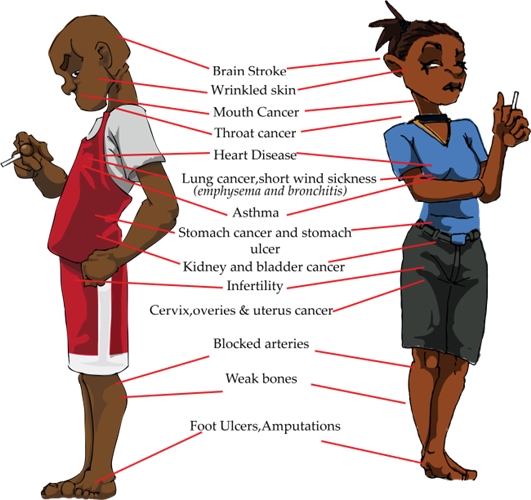How would you feel if I told you that with every cigarette comes a dose of insecticide, car exhaust, gas chamber poison, ant poison, floor cleaner, mothballs, and nuclear weapons? Probably not great. The following have been found to help make-up cigarettes:
Insecticide – nicotine
Car exhaust – carbon monoxide
Gas chamber poison – hydrogen cyanide
Ant poison – ammonia
Mothballs – naphthalene
Nuclear power – radioactive compounds
The Benefits of Quitting Smoking | Amazing Things Happen if You Stop Smoking Right Now
What happens when you quit smoking? If a cigarette is in your mouth right now, finish it. Once you finish it, don’t ever pick up another one. If you did this right now, your body would go through amazing changes starting just 20 minutes after you finish that cigarette. Here are the benefits of quitting smoking and a timeline of what will happen once you quit smoking. To reverse the effects of smoking, simply quit. Here’s why.
In about 20 minutes, your blood pressure and pulse rate will decrease, and the body temperature of your hands and feet will increase.
At approximately the 8-12 hour mark, the carbon monoxide level in your blood will decrease to normal and your blood oxygen level will increase to normal.
At 24 hours the chance of you having a heart attack decreases significantly.
At about 48 hours, nerve endings begin to regrow and your ability to smell and taste is enhanced.
Between 2 weeks and 3 months, your circulation improves, walking becomes easier, and coughing and wheezing is experienced less often. Phlegm production decreases and at about the 3 month mark, lung function is significantly improved.
Between 1 and 9 months, you will experience all of the benefits already listed in addition to less sinus congestion, fatigue, and shortness of breath. Cilia, tiny hair-like structures that move mucus out of the lungs, also regain normal function.
In 1 year, your risk of coronary heart disease and heart attacks is reduced by half of what it used to be when you were a smoker.
Between 5 and 15 years, the risk of having a stroke returns to normal, before you started smoking.
At about the 10 year mark, your chance of developing various cancers including cancer of the lungs, mouth, throat, esophagus, bladder, kidney, and pancreas, greatly decreases. Risk of lung cancer reverts to that of a non-smoker. In fact, Diet and smoking habits make up nearly 60 percent of cancer cases.
In about 15 years, your risk of coronary heart disease and heart attack shifts to that of a person who has never smoked before. The risk of death also drops nearly to the level of a non-smoker.
Even with the exclusion of the incredible amount of money you would save from quitting, the above benefits of quitting smoking are more than convincing.
Second-hand Smoke and Your Pets
Huge Detrimental Effects of Smoking As one may suspect, tobacco smoke not only harms humans, it also harms the pets we love. Animals can face problems such as respiratory issues, allergies, and nasal & lung cancer in dogs and lymphoma cats.
Dr. Sharon Gwaltney-Brant, a medical director of the ASPCA’s Animal Poison Control Center, states:
Nicotine from second-hand smoke can have effects to the nervous systems of cats and dogs. Environmental tobacco smoke has been shown to contain numerous cancer-causing compounds, making it hazardous for animals as well as humans
What do you do to protect your pets? Take the smoking outside.
There are a number of studies outlining the potential dangers tobacco smoke has on pets:
A study from Tufts University linked second-hand smoke to cancer in cats. Cats who live in smoke-filled environments are twice as likely to develop malignant lymphoma, the most common feline cancer, as cats who aren’t exposed to smoke. This disease brings down 75% of cats who are afflicted within 12 months.
One study conducted in 2007 from the University of Minnesota found that cats have nicotine and other toxins in their urine if they live with a smoker.
Another study conducted in 2007 conducted by Tufts School of Veterinary Medicine linked second-hand smoke to oral cancer in cats known as squamous cell carcinoma. The chance of suffering from this oral cancer is increased with more smokers in the house as well as if the cat has been exposed for long periods of time.
In 1998, Colorado State University ran a study which found a higher incidence of nasal tumors and cancer of the sinus in dogs living in a smokers home, compared to those not exposed to smoke. Although unfortunate, dogs with nasal cancer often don’t make it past 1 year. The study was published in the American Journal of Epidemiology.
The Toxic Level of Nicotine
The toxic level of nicotine for cats and dogs is 0.5-1.mg of nicotine per pound of body weight.
One cigarette contains about 15-25mg of nicotine, with the butt of the cigarette containing about 4-8mg. Signs and symptoms of nicotine poisoning in your dog or cat include:
Tremors, twitching, or seizures
Drooling
Constricted pupils
Auditory and/or visual hallucinations
Excitement, racing heart (but slow heart rate with small doses)
Vomiting and diarrhea
The most important statement you must tell yourself all day every day is this:
“I am in complete control of my life. I am not controlled by anything or anyone else, and only I make the decisions.”
Realize this, and quitting will be the easiest thing you’ve ever done, but it certainly won’t be the last. Just make a firm decision that you will stop smoking now, and then get ready to experience the enormous benefits of quitting smoking.


